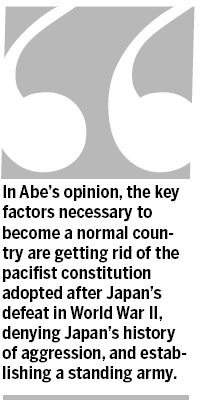More belligerent Japan on the cards
The Abe administration will on the one hand actively leverage economic and trade cooperation with China to develop the Japanese economy, and on the other hand it will get tough with China over territorial disputes in the East China Sea.
Abe vowed that he would never make concessions over the "sovereignty" of the Diaoyu Islands, and is seeking to enable Tokyo's Self-Defence Forces to launch pre-emptive strikes at so-called enemy bases, while proposing that top-level talks with China should be held soon and without preconditions.
He is trying to blame China for the rising tensions, while in fact it is his administration that has soured Sino-Japanese relations. By recommending the establishment of its version of a Marine Corps, holding US-Japan joint military exercises on a regular basis, strengthening deployment of troops in the southwest to protect "its outlying islands", improving its military intelligence gathering capabilities, early warning, surveillance, emergency mobility and flexible response, Tokyo is making military preparations to forcibly occupy the Diaoyu Islands.
If maintaining "its maritime rights" in the East China Sea hinders its economic recovery, Japan will probably prioritize the economy and reduce the frequency and severity of its provocative actions, but it will still focus on achieving effective control over the Diaoyu Islands and exclusive jurisdiction of the sea areas claimed by Japan.

Japan, of course, wants to have it both ways; it wants to share in the dividends from China's economic growth, while maintaining a hardline stance in its relations with China. It is therefore extremely unlikely that there will be any dtente in bilateral relations during Abe's term in office. Sino-Japanese relations face a grim test in the coming years.
A huge variable in the dispute between China and Japan in the East China Sea is Washington's position and changes in its actions. These changes are mainly subject to the United States' overall interests, which is to prevent a union between Beijing and Tokyo, create and maintain certain disputes between China and Japan, while keeping Sino-Japanese disputes under control.
The US, therefore, acts as the occasion demands, sometimes taking sides with Japan, sometimes with China.
If Japan goes too far in denying history, violates the international consensus, or shows clear ambition in breaking away from the US and pursuing political independence, the US will try to contain Japan; if China's development makes the US feel its hegemony is being challenged, then the US will continue to use Japan to try and contain China. The building of a new type of power relationship between China and the US will help to alleviate the above-mentioned contradiction and confrontation and ease the tense security situation in the Asia-Pacific region.
The author is a law researcher with the Naval Research Institute of the People's Liberation Army.



















